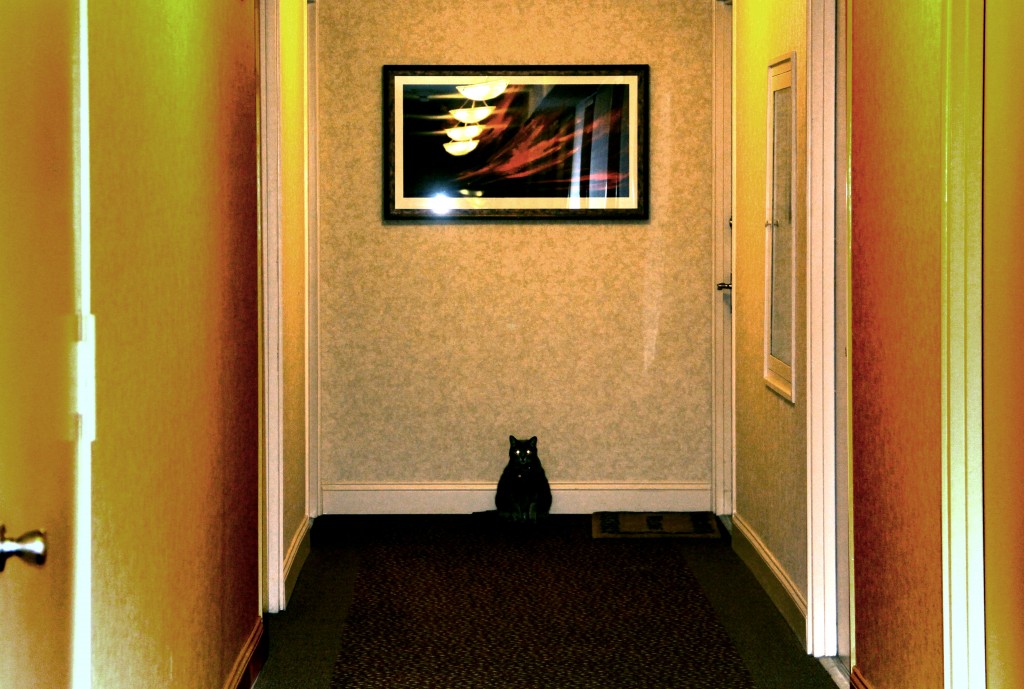I considered writing something about the recent primaries in Michigan and Arizona, in advance of Super Tuesday, but things have become so mind-numbingly bizarre I’m not sure I’d have anything relevant to say, at least not about this particular election cycle. As a personal observation, I’d like to say that any of the Republican candidates still vying for the nomination disturb me. Romney is the least noxious, but that’s hardly a reason to vote for someone (and yet, we often do). I don’t find him as objectionable as the other three, and in another era he would probably be a half-way decent president. But he would be a creature of his party and right now the GOP is in the process of a major meltdown.

Whether you agree with their policies or not, this is simply a fact that cannot be denied. Of course, many Republicans are very good at denial, which is one of the reasons their party is in the shape it’s in. Climate change, bailouts, evolution, birth control…their favorite word has become No and unfortunately for them you can’t run a government that way, much less a country. With the addition of the small but inordinately vocal and strident Tea Party contingent in 2010, the internal workings of the GOP have become untenable. If you don’t believe me, just look at John Boehner sometimes when he’s not being interviewed. The man is, I think, reasonable, but he’s saddled with an unruly bunch of pseudo-libertarians who think the best way to fix things is to do a complete tear-down and start all over. Combine them with the contingent that seems to believe the only citizens in the country are in the seven-figure income club and you have a recipe for doing virtually nothing for ordinary citizens. Boehner is not just trying to herd cats, he trying to guide a creature that is a cross between a honey badger and a burro. (I know, I know, that’s supposed to be the Other Party’s symbol.)
It has been so long since the sides in this war were formed, most people can be forgiven if they don’t really know what the fighting is all about. Here’s a quick rule of thumb for the battle lines that were drawn up way back in the Sixties and had concretized by the Nineties.
Republicans have traditionally been the party of the individual. This is the party that supports the self-made man, the entrepreneur, but there was a time that did not always mean the millionaire. They believe that America is made strong by encouraging and even occasionally forcing individuals to strive, on their own, to Make It. That interference from government hinders that potential, therefore as little control from above as possible should be applied. Let people go out and struggle and then reap the rewards of their efforts.
As quaint as that may sound, it’s a good philosophy, and it’s based on sound principles borne out by experience.
Democrats have traditionally been the party of factions. Large groups are their natural constituency, often groups made up of those who have been unable to compete in the individual struggle and ended up at the bottom of the heap. Consequently, they have been the advocates of trade unions, minorities, and various organizations that claim to speak for the voiceless.
You can see how this played out during the Great Depression. Few of the programs that FDR pushed in his first years were in any way original—or Democratic. Hoover started most of them. But Hoover did so with such penny-pinching trepidation, bolstered by his belief that direct government aid would damage the American worker and make him hopelessly dependent, that none of them did a bit of good. Still, he might have sold it had not the Bonus Marchers been met with the same pecuniary stinginess and, when they refused to go home, tanks. As soon as General Douglas MacArthur finished burning the shanty town of impoverished veterans out than Hoover told his staff that they had just handed the election to Roosevelt.
FDR funded Hoover’s programs to the hilt and started the slow process of digging the country out. He wasn’t much interested in the effect government aid might have on individuals, all he knew was that one-in-four American workers were unemployed, and that 25% made a big group that had to be dealt with, individuals be damned.
The philosophical differences could not have been more manifest.
And FDR was right. This was not a crisis of ordinary proportions, it called for something more. Hoover and the Republicans worried over the effects of big government and were willing to let people starve to preserve the principle. (Not really, but they kept insisting private charity should take up the slack, ignoring the growing evidence that private charity was as overwhelmed as everyone else. They didn’t really want anyone to starve, they just thought it should be compensated for privately, not through government. Sometimes, size matters.)
Now we come down to the present. Since Reagan came to power, these traditional lines have hardened. There are problems with the Democratic insistence that groups matter more than individuals. People cannot be dealt with in cookie-cutter fashion. Democrats have long been blinded by the unstated but implicit assumption that individuals who can take care of themselves (A) don’t need anything from government and (B) are dangerous to programs aimed at groups. This has led to some disastrous legislation from time to time, as in the Welfare Act of 1965 and Department of Education policies that ride roughshod over local school districts. Their one-size-fits-all approach has caused damage, just as unintended, I’m sure, as Republican’s inability to recognize when individuals just can’t get out of a hole on their own.
In times when there was an equitable distribution of reasonableness across both parties, these differences offset each other. Not perfectly, but things got done that actually did the country good. Sometimes you have to treat problems from a group perspective. Other times, you have to stand up for individuals.
But in both instances, these are policy problems, not something for which you go to the mat as though your soul depended on it. As the prime motive of an ideology, they are dangerous, and we’re seeing the results of just such an embrace now.
An underlying part of the disparity of viewpoint between the two, related to their fundamental differences, is their respective attitudes toward systems.
Let me explain. As people mingle, communicate, build, etc, they inevitably build systems. Infrastructure, certainly, like roads, railways, canals, telephones, and the like, but also social systems, which are like the deltas of great rivers—channels dug by long use that are difficult not to use, that direct the flow of people and sometimes ideas along lines that become preset. We sometimes call this culture, but culture is more than just a social system.
It seems—and my own interaction with Republicans over the years tends to support this—that Republicans don’t care to credit systems very much. Their traditional insistence on the hegemony of the individual underplays and often rejects the idea that systems matter much. An individual genuinely self-motivated can circumvent or even ignore systems. Which suggest that for those who don’t, can’t, or won’t do so choose not to. Hence you get the belief that poverty is indicative of the person’s will or character rather than a consequence of systems.
Democrats for their part tend to fall to the other side and place an overemphasis on the effect of systems, that in fact they are all that matter, and those individuals who can effectively ignore them are aberrations.
Now, I don’t suggest that each individual Republican or Democrat consciously thinks along these lines—but taken in aggregate the trends are obvious. (In a curious way, it’s almost a Nature vs Nurture argument, and when you look at the rhetoric of the extremists on both sides this emerges quite clearly—American exceptionalism on the one hand, American Imperialism on the other.)
What has also been clear historically—and I am speaking now of all history, not just American—is that those who grasp the fundamental operation and importance of such systems usually end up acquiring the power. (As a dramatic example, consider the French and the Germans of 1870. The French believed in elan, the courage of the individual French soldier, that as long as one had elan, nothing could defeat him. The Germans believed in training and logistics. The Germans won.)
The GOP has gone through a curious metamorphosis, though, over the last 30 years. While still operating from their basic premise that individuals matter most—and I have actually not heard any of them state this as a principle in a long, long time—they have fought the Democratic Party for control in order to save the country from an overburden of systems, which the Democrats consistently advocate as solutions to all sorts of problems, often to the detriment of the very people they seek to serve. In order to do this, they have honed their tactics and policies to the point where in order to deprive the enemy of the ability to conduct the war they have focused on funding and, paradoxically, on a kind of intellectual eugenics. While the individual matters most, they seem to advocate, only a certain kind of individual is really meant. This has led them to abandon the progressivism that once made up a significant part of their party philosophy—because progressivism was becoming more and more a matter of systems, vis a vis the so-called Safety Net and through federal education initiatives and so forth. Now, to take the extremist view, only True Americans are important, and they are defined by—
Well, that’s a problem. What constitutes a “true” American?
No matter. Someone will do that along the way, in fact the very individuals they are defending and encouraging will do the defining, and that has led them into a cul-de-sac wherein the members of the club are setting the admission standards and they get stricter and stricter every year.
This year, whether they intended it or not, they seem to have defined women out of the club. Along with gays and along with certain economic minorities and along with anyone who might otherwise qualify for membership who supports the aforementioned groups.
What I fear is they have defined themselves out of a viable constituency, because the definitions are narrower even as in the general population the definitions are broadening. The Democrats are better able to make political gains in this situation, if they so choose, because this is how social systems operate, and they are all about systems.
I’m not optimistic about this in the long run. As usual, both parties are missing certain fundamental realities. The Democrats have always bothered me the way trade unions bother me. I think we need more unions, but I don’t like them. I see them as necessary monsters, because, as unitary systems, they have little room for individuals with needs that aren’t part of the whole. I think we need them because the people who own the businesses are not kind and gentle souls, but single-minded, acquisitive wolves. It is not that such people don’t care about people but that people to them are simply components. Components in a system under their control.
And paradoxically these are the people that Republicans tend to support as examples of individuals.
I do not want to see the destruction of an organized conservative party. Unbridled progress can be as destructive as the utter suppression of progress. We need both in order to have a viable community. The worst aspects of the Democratic Party have not manifested for a long time simply because the Republicans waged a somewhat successful campaign against liberalism and the Democrats, in order to hang onto some power, moved to the right, and are now almost as centrist as Republicans of the Sixties and Seventies were. Systems, remember? They followed the runnels of the systems. But if the GOP melts down and fragments completely, we may see a different sort of Democratic Party emerge.
Right now, though, it appears to me that meltdown is on its way. The GOP has lost touch with the average American in a big way. They are becoming marginalized and if not this year then by the midterms of 2014 we will see them grappling with the death throes of becoming irrelevant. They have bent their ear to individuals, true, but only the individuals who still seem to talk to them, and they are a rarefied group indeed.
On the other hand, I may be overstating it. Whatever the case may be, something has to change within the GOP. They cannot survive as a party of extremists.



